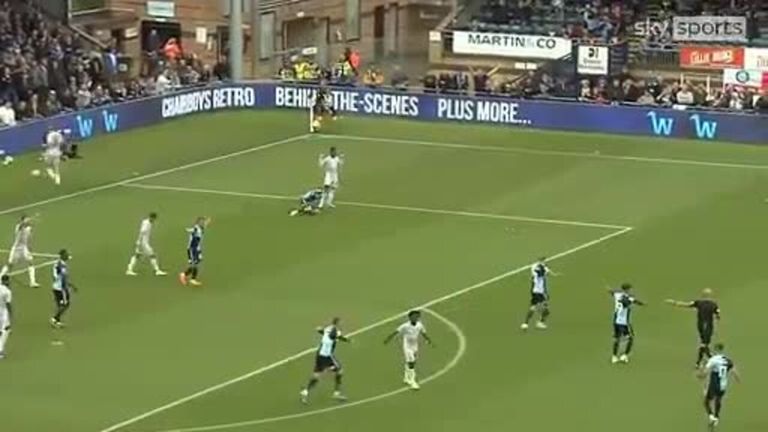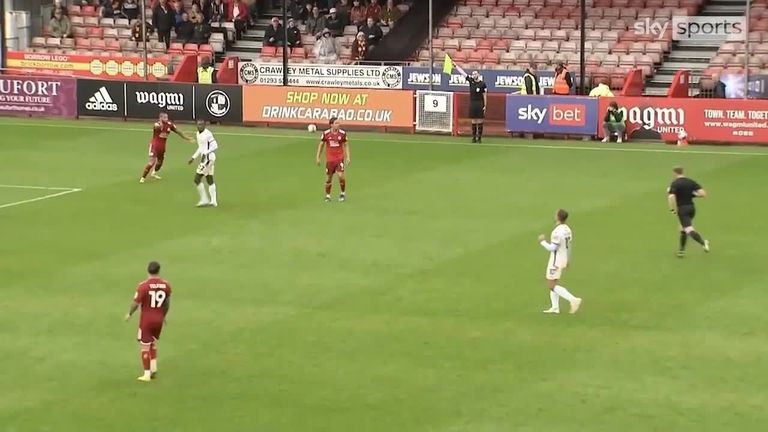The EFL has returned and with it the Behind the Whistle feature where former Premier League referee Chris Foy goes through a selection of key match decisions from the opening weekend of the Sky Bet Championship, League One and League Two.
Behind the Whistle aims to give supporters of EFL clubs an insight into the decision-making considerations and also clarification of certain calls to provide an understanding of how the laws of the game are interpreted.
As part of a regular feature on Sky Sports following the conclusion of a matchday, Foy will be here to run you through some refereeing matters in the EFL, starting with the below….
Sky Bet Championship
Bristol City 1-1 Preston North End
Incident: Goal scored – potential handball (Preston)
Decision: Goal awarded (Preston)
Foy says: This is in relation to Preston North End’s equalising goal and a potential handball in the build-up.
It is important to remember that not every contact between the ball and the arm is a handball offence. In this case whilst the ball does hit the hand of the Preston No 10, it is entirely accidental and doesn’t directly impact the goal itself with Preston’s No 25 then flicking the ball towards the eventual goalscorer, Preston’s No 7.
In line with the laws of the game, this was the correct decision to allow the goal to stand. It is only when an attacking player scores a goal immediately that an accidental handball is penalised.
Stoke City 4-1 Rotherham United
Incident: Potential red card – second yellow card (Rotherham)
Decision: Red card awarded – second yellow card (Rotherham)
Foy says: I think that on balance this challenge doesn’t meet the threshold for a yellow card to be given.
From the referee’s perspective, the tackling motion give the impression of an almost scissor-like action, hence why he made the decision in real-time that it was reckless and a yellow card.
However, given the speed and the contact being a glancing contact, I think the better outcome would be to have given a final warning to the defender.
Sky Bet League One
Bolton Wanderers 3-0 Lincoln City
Incident: Goal scored – Potential goal-kick (Bolton)
Decision: Corner awarded – Led to goal scored (Bolton)
Foy says: My view is that ultimately the correct decision would have been to award a goal-kick, as with the benefit of watching the replay, it does show that the final touch before going out of play is off the Bolton attacker.
Whilst there are two defenders impacting the view of the officials, I think with the high standards of performance in mind, this is a decision that the officials collectively should have recognised as a goal-kick.
Wycombe Wanderers 0-3 Exeter City
Incident: Potential penalty (Wycombe)
Decision: Penalty not awarded (Wycombe)
Foy says: Whilst there is contact between the defending player and the attacking player, crucially for me, there was no definitive action that would impact the attacking player enough, to have a consequence of tripping.
Given the high threshold referees are now looking at when making these decisions, the actions of defender, attacker and consequence of the contact are all taken into account – not every contact is a foul. This all leads me to believing this was the right call.
Sky Bet League Two
Crawley Town 1-0 Bradford City
Incident: Potential red card – second caution (Bradford City)
Decision: Red card awarded – second caution (Bradford City)
Foy says: There is a foul committed and the defender takes a risk in committing it, particularly as they have already been cautioned earlier in the game. However, it is an upper-body challenge, and not a clearly reckless tackle and there is a covering defender to take into consideration, so not a clear promising attack either.
Similar to the Stoke City vs Rotherham incident, my view is the better outcome would have been to talk to the Bradford City player and not issue a second yellow card.
Tranmere Rovers 1-2 Barrow
Incident: Potential penalty (Tranmere)
Decision: Penalty awarded (Tranmere)
Foy says: This is quite a straightforward decision and the referee has got it spot on.
Ultimately, the defending player has been a little slower to react to the ball into the box than the attacking player. Once the attacking player gets to the ball first, clear careless contact is inevitable with the consequence of tripping and the penalty was rightly awarded.





